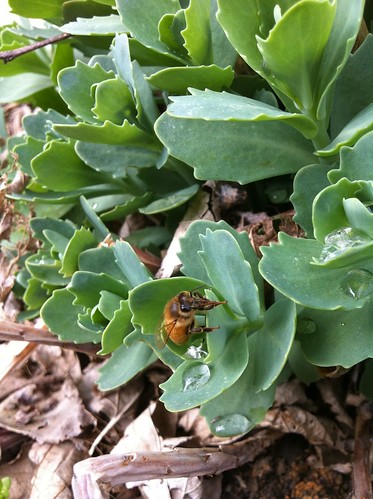 |
| cleaning her proboscis |
When you do your winter reading about bees, you'll often find that they won't/can't fly if the temperature is below 50ish (well, of course you'll find a number of thresholds cited, but they all kinda hover in 50s). When you talk to other beekeepers, they'll affectionately remind you that bees don't read books. Point taken.
This Sunday, the temperature hovered in the low to mid 40s. I'll admit, the bees didn't seem very adventurous. Like kids cut loose for the first time from their parents, they seemed uninterested in straying too far from the hives, and instead scoured a 20 foot radius for ANY sign of nectar, pollen or water. It created a weird phenomenon. Walking back toward the beeyard, you eventually crossed this line--right about at our last raised bed--into wall of soft buzzing and a thin carpet of bees.
Poor girls seemed desperate to work anything they could, holding out that perhaps THIS lettuce head offered nectar within its leaves. I was able to capture a pretty cool video of a bee drinking from a large water droplet on a sedum plant. You can see the bee's tongue (proboscis) fully extended slurping it up. Water droplets just look so solid and buoyant on sedum, don't they?
This video of Columbia's entrance--in addition to being hypnotic--shows another problem honeybees experience with cold weather: the need to eliminate. Even in winter, bees are still processing honey and pollen and like all of us, need to pass waste. Bees are quite fastidious, generally speaking, and dislike doing their business in the hive. In winter, those random, freak warm days are essential for the bees to be able to take "cleansing flights." You can tell they left the hive in a hurry by the high volume of bee scat on the alighting board below.

No comments:
Post a Comment